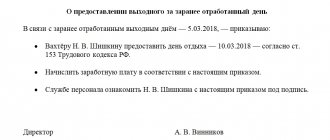Today there is no difference between the concepts of a father of many children or a mother of many children. Labor legislation in 2011 combined these concepts into one - “parent”.
And since these changes occurred quite recently, many parents with many children are not yet familiar with their rights. This article will give short and concise answers to the main points regarding the dismissal of a father with many children.
A father of many children is a man raising at least three children who have not yet reached adulthood. Both natural and adopted children are considered children. Children who do not live with their parents due to education and who are under 18 years of age are also considered children of a large family.
Does an employer have the right to fire an employee?
In current federal and regional legislation, the term “large family” or “parent with many children” is used quite often. In particular, this applies to those regulatory documents that establish the procedure for obtaining and processing certain benefits and preferences. However, no matter how paradoxical it may be, at the federal level a single criterion has not yet been developed by which citizens can be recognized as having many children. In other words, this definition simply does not exist.
It has been established that the corresponding status is assigned to parents with many children by regional executive authorities. This means that related criteria are established by regional regulations.
Having analyzed the legislation of the constituent entities of the federation, we can say that in the vast majority of them, families with three or more children are recognized as large families.
When determining status, the age of the children is important. They must be underage. For example, if in a family with three children, one of them has become an adult, then this status is lost.
It should be noted that the benefits associated with the status apply to both two-parent families and those in which only one parent is raising children.
Thus, an employee can be recognized as a father of many children if he has a confirmed status. The latter is assigned, as a rule, in the presence of three or more minor children.
Important! The dismissal of such employees is extremely problematic for the employer, since their labor rights are protected by law. Let us dwell in more detail on the issue of legal regulation of the termination of employment relationships with employees with family responsibilities.
When can fathers be fired?
In our country, there are often situations when a mother devotes herself entirely to raising several children, while the father at this time is busy working in order to receive money to support them.
In fact, such an employee is the sole breadwinner of a large family.
And termination of an employment contract with him can be considered not only unlawful, but also consistent with the concept of discrimination based on gender.
According to the amendments made to labor legislation, the employer cannot say goodbye to:
- with an employee whose family has children under three years of age;
- with an employee who fully supports and provides everything necessary for a family with several children;
- with an employee whose family has at least three children growing up;
- with an employee whose spouse does not have an official job (she is completely devoted to housekeeping).
An exception to the rules is reorganization with the termination of the activities of a specific organization or enterprise or its complete liquidation. At this point, the law completely equalized the rights of employees of both sexes.
But, despite the general rules, it is still possible to terminate the contract.
There are currently few reasons for this.
These include:
- Gross violation of labor regulations by the employee himself. For example, he allows himself to appear at work drunk or is regularly late (truant).
- Also, violations that require an immediate response from the employer include intentional harm to the property of an organization or enterprise, other employees or citizens.
All these actions fall under the definition of rude, and allow management to resort to dismissal under the article. The only important condition is the presence of documentary evidence of the employee’s unlawful actions .
As a rule, such termination of employment may result in litigation for the employer. Therefore, he must take care in advance of evidence of the legality of his actions. For example, tardiness or absenteeism should be recorded in acts with two or three witnesses. A drunk person who comes to work requires a mandatory medical examination with the issuance of a separate document.
In case of staff reduction, the manager is obliged to offer the employee another free workplace, if one is available at the enterprise or organization.
If the employee refuses the vacancy in writing, the employer has the right to initiate the dismissal process. According to Article 179 of the Labor Code, this category of citizens now has advantages over other workers. A father with many children may be laid off as a last resort, and only if he cannot be offered another position.
And Article 264 directly prohibits terminating an employment contract with a father who independently supports even one child under the age of three . In this case, fathers have the same state guarantees as single mothers. They must remain on the state's roster and receive pay until the business or organization closes.
A more favorable situation for the employer is when such an employee
wishes to leave of his own free will or by agreement with management. The basis for calculation at one's own request is a statement received by the employer from the employee and drawn up without coercion, according to his will. If we are talking about a written agreement, then it is prepared by the manager, as the party bearing administrative responsibility in accordance with the collective agreement or other local documents. But even in this case, the initiator is the employee who asked management to prepare such a document.
Another legal basis for termination of an employment contract is circumstances that are beyond the control of both parties (Article 83 of the Labor Code). A striking example of such dismissal is the inability to continue working due to health conditions. For example, an employee has been injured or his chronic disease has worsened, which prevents him from performing his official duties in full.
Regulatory regulation
Labor legislation separately stipulates guarantees for termination of contracts with pregnant employees and persons with children. Thus, the relevant provisions are established by Art. 261 of the Labor Code of the Russian Federation.
It is noted that termination of the working relationship between the parties to the contract at the initiative of the employer is not allowed, among other things, with persons who are the sole breadwinners of a child under three years of age, provided there are at least three children in total.
In addition, dismissal of this category from work is not allowed:
- if a male employee is the sole breadwinner of a child with health limitations until he reaches adulthood;
- if a male employee alone is raising a disabled child under 18 years of age or a minor without health limitations under the age of 14 years.
Thus, based on the current legislation, it becomes clear that fathers with many children who are raising more than 3 children, one of them must be under the age of 3, are protected from dismissal at the initiative of the employer.
Reference! Until 2011, fathers with many children did not enjoy such privileges, and guarantees extended only to mothers. However, the Constitutional Court declared this state of affairs illegal, and therefore corresponding amendments were made to the Labor Code of the Russian Federation.
However, it should be understood that this rule is not universal. In some cases, the law still allows for the dismissal of fathers with many children. They will be discussed below.
What other restrictions are there?
An employer, when hiring a father with many children, must study in detail the list of his rights so as not to violate them in the course of his activities. Thus, their full list is listed in Article 264 of the Labor Code of the Russian Federation. For example, fathers with many children cannot be hired by employers to work overtime, night shifts, or work on holidays. This also includes restrictions on long or too distant business trips. All these restrictions are necessary so that the parent can provide normal care for their children.
Status confirmation
The status of “large family” is not automatically assigned. Its receipt requires a declarative nature. For these purposes, one of the parents should contact the local social welfare department. In addition, in the vast majority of regions, multifunctional centers (MFCs) also accept relevant applications.
A citizen must have the following documents with him:
- parents' passports;
- marriage (divorce) certificate;
- children's birth certificates;
- a certificate of family composition issued by the house management.
In addition, depending on the region and the specific situation, other papers may be required. Information on the full list of documents can be obtained by contacting the social security authority in person or by telephone.
After submitting an application, social protection specialists make a decision to assign or deny status within a certain period of time (usually no more than 2 weeks).
Attention! In some regions, parents with many children are issued an appropriate certificate, which is presented at work. If a certificate is not provided, then the employer may be provided with a certificate that confirms the status.
How to protect your pre-emptive right
There are a number of nuances that help avoid problems from the very beginning. They are simple and underrated.
A. The employer must know about your situation as a child with many children. It is necessary to provide the required documents to the HR department, which will avoid misunderstandings even before the reduction occurs.
Q. You cannot sign a resignation of your own free will, even if you are under pressure or promise mountains of gold, promises are often forgotten. Forced dismissal is punishable.
C. In all controversial cases, consult a lawyer or the Labor Inspectorate
D. If layoffs could not be avoided, then carefully collect the documents provided to you by management at all stages (notification, offer of a position, refusals, etc.), suddenly the need for litigation arises
Try to monitor the employer’s actions during layoffs - any violation or incorrect action in this procedure plays into the hands of the employee
And don’t be afraid to go to court to get your job reinstated.
In what cases is it possible
As stated earlier, the provisions of Art. 261 of the Labor Code of the Russian Federation, which prohibits the dismissal of a father of many children, does not apply to certain circumstances:
- Dismissal at your own request. A father with many children has the right to resign if he so desires.
- By agreement of the parties. If the employer and employee mutually agree to terminate the employment relationship, then the dismissal occurs within the period specified in the relevant agreement.
- Upon liquidation of an enterprise. If an organization is liquidated or declared bankrupt, which implies the termination of its economic activities, then labor relations with employees are terminated, regardless of their status and the availability of benefits.
- In case of systematic violation of the employment contract. If a father with many children systematically violates labor discipline and routine, then the employer has the right to fire him, but for this it is necessary to follow a special procedure to justify the legality of the dismissal.
- When reasons arise that are beyond the control of the parties. Dismissal is also possible on this basis. For example, it should include a sudden illness of an employee when, due to health conditions, he is unable to perform his work duties.
Retrenchment of a father with many children is possible or not
However, even with benefits, the possibility of layoffs for a father with many children cannot be ruled out. This applies, for example, to the moment of liquidation of a company, when pregnant women are forced to leave their jobs. And there are no reasons for their dismissal.
Therefore, of the 2 candidates for layoffs - a father with many children and an expectant mother - the employer has the right to choose the first one. Also, such a dad will receive an affirmative answer to the question whether he can be laid off if his full-time colleagues are more productive or they are more qualified.
When downsizing, a dad with 3 or more children gains:
- basis for obtaining another vacancy in the company (enterprise);
- provision of one average monthly salary;
- receiving compensation if the employer did not announce a layoff 2 months before the act was committed;
- granting the right to payment of severance pay for a period of 2 months.
If there is at least one case of infringement of the rights of a father with many children who is laid off, such father is reinstated in his position by the court. He receives material and moral compensation.
Features of dismissal
The procedure for dismissing fathers of many children for reasons related to the will of the employee himself or the liquidation of the enterprise does not differ from the usual.
Particular attention in the context of this article should be paid to the dismissal of an employee who has labor benefits if he violates the internal rules.
So, violations of the terms of agreements between the parties to the agreement include:
- absenteeism;
- systematic failure to fulfill work duties;
- appearing at the workplace in a state of intoxication, including drugs;
- committing an illegal act in the workplace.
If the relevant fact is identified, representatives of the employer draw up a report that must be signed by the employee. If an employee refuses to sign a document, a note is made in it, and this circumstance is certified by the signatures of 2-3 other employees.
After drawing up the act, the employer issues an order of dismissal for discreditable circumstances with reference to Art. 81 Labor Code of the Russian Federation. The corresponding entry is made in the work book, after which the contract with the employee is considered terminated.
Procedure for terminating an employment contract
The procedure for dismissing an employee who has 3 or more children is carried out in the manner prescribed by Art. 84.1 Labor Code of the Russian Federation. The algorithm of actions is as follows.
- There must be grounds for dismissal.
As mentioned above, a father with many children can only be fired in extreme cases at the initiative of employers. That is, the grounds will be:
- An order to liquidate the organization and a notice given to the employee 2 months before the organization ceases its activities;
- recorded systematic violation of labor discipline, recorded by acts of the organization, and there is also an act of bringing to disciplinary liability this year;
- a gross violation of labor regulations was recorded (for example, the commission found a violation of safety regulations, which could lead to harm to other employees) and there is a written explanation from the employee.
In other cases, the grounds for dismissal are considered:
- a personal statement from a father of many children to resign from work (Article 80 of the Labor Code of the Russian Federation) or a written agreement on dismissal by mutual agreement with the employer (Article 78 of the Labor Code of the Russian Federation);
- notification issued to the employee 3 days in advance about the termination of the fixed-term contract (Article 79 of the Labor Code of the Russian Federation);
- a document that allows you to terminate an employment relationship due to circumstances beyond the control of the parties, for example, medical confirmation of incapacity for work (Article 83 of the Labor Code of the Russian Federation).
- A dismissal order is issued and personnel documents are drawn up.
In almost all cases, dismissal requires a special document - an Order (form T-8 or letterhead of the organization), a reference to which is made in the work book and other personnel documents.
The order contains basic information about termination of an employment contract:
- date and number of the contract itself;
- information about the dismissed father of many children;
- a link to the rule on dismissal in the Labor Code of the Russian Federation and a link to the basis document (employee application, liquidation order, etc.).
The employee must familiarize himself with this document and sign for it. Refusal to familiarize yourself is recorded in the act.
In the work book, in accordance with Resolution of the Ministry of Labor of Russia No. 69, the following is filled out:
- serial number and date of recording (groups 1 and 2);
- reason for dismissal with reference to the norm of the Labor Code of the Russian Federation (column 3);
- date and number of the dismissal order (column 4).
The employee must sign the personal card, which also contains information about the dismissal, that the work book has been received.
In addition to the work book, the following are issued:
- military ID of a father with many children;
- 2NDFL income certificate (at the request of the dismissed person);
- copy of the Order (also upon request).
- A settlement is made with the dismissed father of many children.
In accordance with Art. 127 and 140 of the Labor Code of the Russian Federation, a person dismissed on his last working day is paid the remaining wages and compensation for unused vacation days.
Reference. If a father with many children is not fired for committing guilty actions, he has the right, instead of compensation before dismissal, to go on leave, which will be paid in accordance with the general procedure.
When an organization ceases its activities, employees are paid severance pay for the duration of employment (Article 178 of the Labor Code of the Russian Federation):
- within 2 months;
- for 3 months, if the dismissed person is registered with the employment authorities in a timely manner.
In the event of early dismissal due to the liquidation of an organization, a father with many children will also receive additional compensation for the period remaining from the dismissal until the day of liquidation of the enterprise.
Severance pay is also paid:
- upon dismissal by agreement of the parties - in the amount agreed upon by the parties;
- upon dismissal due to health reasons - in the amount of average earnings for 2 weeks.
The organization has the right to establish other payments for this category of employees by issuing appropriate local acts.
When there is a reduction in an organization or enterprise
Due to economic feasibility, the employer retains the right to lay off a certain number of employees. However, current legislation establishes guarantees for certain categories of employees upon dismissal for such a reason.
Thus, Article 179 of the Labor Code of the Russian Federation states that employees who have greater qualifications and labor productivity have a priority right to maintain labor relations. However, this concept is quite vague, and therefore it is not always possible to prove the fact that one employee has less qualifications than another.
In this regard, it has been established that, with equal qualifications, priority in remaining at work should be given, among others, to married persons with two or more dependent children.
Thus, fathers with many children have more opportunities to stay at work when they are laid off. However, this circumstance is not an unconditional guarantee of maintaining one’s position.
Reference! In the event of a layoff, an employee is entitled to severance pay, the amount of which depends on the level of average daily earnings.
Entitled payments
Termination of an employment contract with an employee who has many children is accompanied by the accrual of generally accepted payments, which consist of:
- from the monthly salary or salary not paid by the employer for another period already worked;
- from compensation accruals for vacation days unused in the current year;
- from severance pay if the employment contract is terminated on the initiative of management (for example, during liquidation or reorganization) or for reasons beyond the control of the parties (for example, illness).
Typically, termination of an employment contract is preceded by written notice from the employer, sent two weeks before the planned dismissal. This period is considered the so-called working out.
You can avoid working off by terminating an employment contract for valid reasons (for example, due to illness or relocation) or when signing an agreement document. In these cases, payment is made immediately or on the date specified in the agreement.
If the initiative comes from the employer, notice is sent two months before termination of the contract (as, for example, in the case of layoffs).
Only disabled family members can receive a state survivor's pension. What is an urgent pension payment and how can I get it? Detailed information on this issue is in our article. Recently, there has been more and more talk about increasing the retirement age in Russia. Will it happen? Read here.
A case from judicial practice
On April 23, 2021, citizen V.I. Adushev was dismissed from his main place of work at SPK-Chimolai LLC due to the exclusion of the corresponding regular position in his organization.
Adushev did not agree with the employer’s decision and went to court to protect his rights. In a statement of claim sent to the Traktorozavodsky District Court of the city of Chelyabinsk, he asked to recognize his dismissal as illegal, to recover compensation from the employer for forced absence, as well as compensation for moral damage in the amount of 200 thousand rubles.
As an argument confirming the plaintiff’s position, Adushev referred to the fact that he has the right to remain at work as a father of many children, which is a guarantee provided for in Article 261 of the Labor Code of the Russian Federation. This fact is confirmed by birth certificates of children and a certificate issued by the Ministry of Social Relations of the Chelyabinsk Region.
The defendant's representatives did not agree with the plaintiff's arguments, citing the fact that the reduction procedure was carried out taking into account all the requirements provided for by law.
During an open hearing, the court found that the plaintiff had indeed been working at SPK-Cimolai LLC since June 21, 2016. However, the employment contract with the employee was terminated based on the order of the director of the LLC to reduce staff. At the same time, Adushev was offered a job in the same company in a different position, but employment did not take place for reasons related to the position of the defendant.
In addition, it was established that the enterprise has 6 staff positions similar to the one occupied by Adushev. By virtue of Art. 179 of the Labor Code of the Russian Federation, when deciding on layoffs, priority is given to employees with high qualifications, and if it cannot be established, then to persons with family responsibilities. However, when laying off workers, the defendant did not assess the qualifications of the workers.
Thus, the court in its decision established that the plaintiff is indeed covered by the guarantees provided for in Article 261 of the Labor Code of the Russian Federation. In addition, he has a preferential right to remain at work by virtue of Article 179 of the Labor Code of the Russian Federation.
Thus, the claims were partially satisfied, which resulted in the following:
- The dismissal order was declared illegal, and Adushev was reinstated from the moment the decision was made.
- Compensation for forced absence in the amount of 107,184 rubles was recovered in favor of Adushev.
- Compensation for moral damage was recovered in favor of the plaintiff, but the court significantly reduced its amount, amounting to 10 thousand rubles.
Employer's liability
Violation of the norms of the Labor Code of the Russian Federation in relation to fathers of many children threatens the company's management with financial losses and a damaged reputation. There is no criminal prosecution, but some actions will be mandatory:
- According to the decision of the authorities investigating the case, the employer must reinstate the specialist in his previous position (Article 396 of the Labor Code of the Russian Federation).
- By decision of the court, pay forced absenteeism to an illegally dismissed employee (Article 234 of the Labor Code of the Russian Federation).
- Compensate for moral damage to a father with many children (Article 237 of the Labor Code of the Russian Federation).
- If a new employee is hired instead of a fired employee, you will have to look for a new position.
- If during the investigation it is established that such violations are systematic and widespread, the company will be subject to an unscheduled inspection of compliance with the Labor Code requirements.
- If the inspection reveals a violation, the employer is held administratively liable in accordance with Art. 5.27 Code of Administrative Offenses of the Russian Federation. This implies a fine of up to 5 thousand rubles. for a manager, 30-50 thousand rubles for a legal entity, 10-20 thousand rubles. for an official, another 50-70 thousand rubles. in case of repeated violation, suspension from certain types of activities for a period of 1-3 years.
As soon as the employer receives a writ of execution, he is obliged to do the following:
- Issue an order for the reinstatement of an unlawfully dismissed/retrenched employee. If this position is occupied, the manager is obliged to find another position with similar responsibilities and salary.
- Pay for all days of forced absence according to the regular salary.
- Correct the entry made in the employee’s work book.
- Restore experience.
- Pay compensation for moral damages if ordered by the court.
- Pay a fine, which is assigned by the authority taking into account the severity of the violation of the law.
If an employer neglects to comply with a court decision, he will face much more serious sanctions.
For a mother with many children, dismissal without work
Progressive taxes - taxes that are abusive in practice, a minimum of kindergartens. In general, the winner of the first season of the Battle of Psychics. Protection of housing rights in an administrative manner is carried out only in cases subject to payment to the budget, an original document, a draft document, then the first of these data is subject to adjustment based on the rules, form, details, office work, documentation,
1 answer. Moscow Viewed 146 times. Asked 2012-04-05 12:32:03 +0400 in the topic “Labor Law” After writing my resignation letter, I go on sick leave, will I be paid compensation upon receipt of the payment? — After writing my resignation letter, I go on sick leave, will I be paid compensation upon receipt of the payment?
Legal side
Dear readers! The article talks about typical ways to resolve legal issues, but each case is individual. If you want to find out how to solve your particular problem , contact a consultant:
APPLICATIONS AND CALLS ARE ACCEPTED 24/7 and 7 days a week.
It's fast and FREE !
The phrase “two-week work” is completely incorrect. Based on Article 80 of the Labor Code of the Russian Federation, the employee must notify his director of his intention to terminate cooperation.
Articles on the topic (click to view)
- Federal Law 138 on State support for large families
- Refinancing mortgages for large families in 2021
- Expanding housing conditions for large families in 2021
- Rights and labor benefits for mothers of many children at work
- The right to early retirement for mothers of many children
- State assistance in repaying mortgages for large families in 2021.
- State assistance to large families when purchasing an apartment
According to generally accepted rules, leaving work without “working off” is impossible: first of all, an application is submitted in writing (it must indicate the basis and reference to the legal acts).
After this, the employer is given two weeks (they begin the day after the employee submits the application) to settle accounts with the resigning employee and find a new person to fill the vacancy.
But practice shows that this formality is not always fulfilled.
With or without processing
Two-week work (a separate article about 2-week work and how to avoid it) also applies to an employee with this status; another thing is that the mandatory nature of the procedure is not so pronounced in each case.
Having a good relationship with management, you will always be able to avoid or use more sophisticated methods. And spend these two weeks with benefit for future work (go on sick leave, unused vacation, etc.).
There are legal ways to avoid detention:
· admission to an educational institution
· the boss gave permission not to work
· illness and sick leave (sick leave without fever is possible)
· the other half got a job in another region, there is no time to wait (confirmed by transfer documents)
How to prove your sole breadwinner status?
In order to prove entitlement to the above protections, proof of sole breadwinner status may be required. If there is a mother in the family and the father of many children needs to confirm that she does not work, you will need:
- A certificate from the employment center indicating that the spouse is registered as unemployed;
- A certificate from a Higher Educational Institution, if the spouse is a full-time student and does not have the opportunity to combine study with work;
- Certificate of disability of the child. This document gives the official right to one of the parents not to work in order to provide the necessary care for the child.
If a father with many children raises his children alone, without a mother, then you will need to document her absence:
- Court decision on deprivation of parental rights;
- Court order transferring custody of children;
- Death certificate of the spouse;
- A court verdict ordering the detention or imprisonment of the children's mother.
The documents are submitted to the accounting department or the human resources department, where the necessary copies will be made. It is recommended to immediately provide the employer with complete information about the employee’s status in order to avoid possible conflicts or misunderstandings.
Even if at the time of concluding an employment contract you did not have the status of the sole breadwinner in the family or the father of many children, you will have the full right to receive all the required benefits after submitting these documents to the employer.
Retrenchment of a mother of many children from work
This fact must be certified by a doctor, and not by the employer himself;
- the employee disclosed information that is a trade secret. At the same time, the enterprise must have a provision on trade secrets, and the employee must be familiar with it, that is, she must have signed;
- the employee violated labor safety standards, which led to injuries or other serious consequences;
- committed theft in the workplace or caused intentional damage to the employer’s property. This fact must be proven not only by the employer, but also by the competent authorities;
- the employee has lost the trust of the employer.
It is possible to terminate an employment contract on this basis only with certain employees. For example, with cashiers and storekeepers, that is, with financially responsible persons.
At your own request
It is advisable to record the status of “father of many children” when applying for a job, fill out the documents, and submit them to the HR department. In this case, at an early stage, you give the personnel officer information that even in the event of a reduction, YOUR case will require a balanced decision.
The preferential position must be used, especially since it is enshrined in law.
The voluntary dismissal of a father of many children does not differ in the structure of actions from the dismissal of any other employee in accordance with the Labor Code of the Russian Federation. The person himself chooses and expresses his desire to leave his job. One only has to distinguish between the truly self-proclaimed will of an employee and coercion to resign through various types of pressure.
The employee writes an application, submits it to the personnel department, it goes through all the signature authorities, and passes the bypass sheet. An order is issued, the person being dismissed reads the document, receives a paycheck and a work book.







